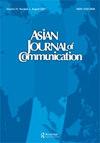Development communication for youth empowerment in Indonesia’s renewable energy projects
IF 1.5
2区 文学
Q2 COMMUNICATION
引用次数: 2
Abstract
ABSTRACT This study examines the use of development communication for youth empowerment in renewable energy projects in Indonesia. During development, youths can be agents of social change and drivers of development. However, their participation is never free from the power dynamics of development actors, i.e. between the government and rural communities, or between youths and elders. Using an appreciative inquiry technique involving community groups in two hamlets in Kulon Progo regency, Indonesia, this study finds that communication development is oriented primarily towards finalising infrastructure development, and fails to consider active participation. Meanwhile, although youth groups hope to be involved in designing and furthering the usage of renewable energy, they feel that their elders are hesitant to involve them in said projects; trust and power distance issues reduce them to passive participants. This study suggests that development communication in rural communities should be planned carefully, and that local values should be incorporated into the process. Although development communication may not result in youth empowerment, it may nonetheless shed light on power gaps and trust issues in youth-elder interactions.印度尼西亚可再生能源项目中的青年赋权发展交流
本研究考察了在印度尼西亚可再生能源项目中使用发展沟通为青年赋权。在发展过程中,青年可以成为社会变革的推动者和发展的推动者。然而,他们的参与始终离不开发展行动者的权力动态,即政府与农村社区之间,或青年与老年人之间。本研究采用了一种涉及印度尼西亚Kulon Progo regency两个村庄社区团体的欣赏式调查技术,发现传播发展主要面向完成基础设施发展,而没有考虑到积极参与。与此同时,虽然青年团体希望参与可再生能源的设计和推广,但他们觉得长辈们不愿意让他们参与这些项目;信任和权力距离问题使他们沦为被动的参与者。该研究建议,应仔细规划农村社区的发展传播,并将当地的价值观纳入这一过程。虽然发展传播可能不会导致青年赋权,但它仍然可以揭示青年与老年人互动中的权力差距和信任问题。
本文章由计算机程序翻译,如有差异,请以英文原文为准。
求助全文
约1分钟内获得全文
求助全文
来源期刊

Asian Journal of Communication
COMMUNICATION-
CiteScore
3.70
自引率
0.00%
发文量
38
期刊介绍:
Launched in 1990, Asian Journal of Communication (AJC) is a refereed international publication that provides a venue for high-quality communication scholarship with an Asian focus and perspectives from the region. We aim to highlight research on the systems and processes of communication in the Asia-Pacific region and among Asian communities around the world to a wide international audience. It publishes articles that report empirical studies, develop communication theory, and enhance research methodology. AJC is accepted by and listed in the Social Science Citation Index (SSCI) published by Clarivate Analytics. The journal is housed editorially at the Wee Kim Wee School of Communication and Information at Nanyang Technological University in Singapore, jointly with the Asian Media Information and Communication Centre (AMIC).
 求助内容:
求助内容: 应助结果提醒方式:
应助结果提醒方式:


